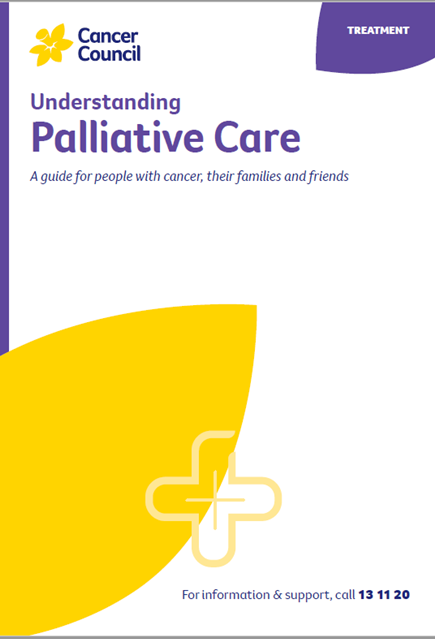- Home
- Cervical cancer
- Treatment
- Palliative treatment
Palliative treatment for cervical cancer
Palliative treatment helps to improve people’s quality of life by managing the symptoms of cancer without trying to cure the disease. It is best thought of as supportive care.
Many people think that palliative treatment is only for people at the end of their life, but it may help at any stage of advanced cervical cancer. It is about living for as long as possible in the most satisfying way you can.
As well as slowing the spread of cancer, palliative treatment can relieve any pain and help manage other symptoms. Treatment may include radiation therapy, chemotherapy, targeted therapy or other medicines such as hormone therapy.
Palliative treatment is one aspect of palliative care, in which a team of health professionals aims to meet your physical, emotional, practical, cultural, social and spiritual needs. The team also provides support to families and carers.
For more on this, see Palliative care and Living with advanced cancer.
→ READ MORE: Managing side effects of cervical cancer
Watch this short video on how palliative treatment aims to manage symptoms and improve people’s quality of life without trying to cure the disease.
Podcast for people affected by advanced cancer
Listen now
More resources
Prof Martin Oehler, Director of Gynaecological Oncology, Royal Adelaide Hospital, and Clinical Professor, University of Adelaide, SA; Dawn Bedwell, 13 11 20 Consultant, Cancer Council QLD; Gemma Busuttil, Radiation Therapist, Crown Princess Mary Cancer Centre, Westmead Hospital, NSW; Dr Antonia Jones, Gynaecological Oncologist, The Royal Women’s Hospital and Mercy Hospital for Women, VIC; Angela Keating, Senior Psychologist, Royal Hospital for Women, NSW; Anne Mellon, Clinical Nurse Consultant – Gynaecological Oncology, Hunter New England Centre for Gynaecological Cancer, NSW; Dr Inger Olesen, Medical Oncologist, Andrew Love Cancer Centre, Barwon Health, Geelong, VIC; Dr Serena Sia, Radiation Oncologist, Fiona Stanley Hospital and King Edward Memorial Hospital, WA; A/Prof Megan Smith, Co-lead, Cervical Cancer and HPV Stream, The Daffodil Centre, Cancer Council NSW and The University of Sydney, NSW; Emily Stevens, Gynaecology Oncology Nurse Coordinator, Southern Adelaide Local Health Network, Flinders Medical Centre, SA; Melissa Whalen, Consumer.
View the Cancer Council NSW editorial policy.
View all publications or call 13 11 20 for free printed copies.

